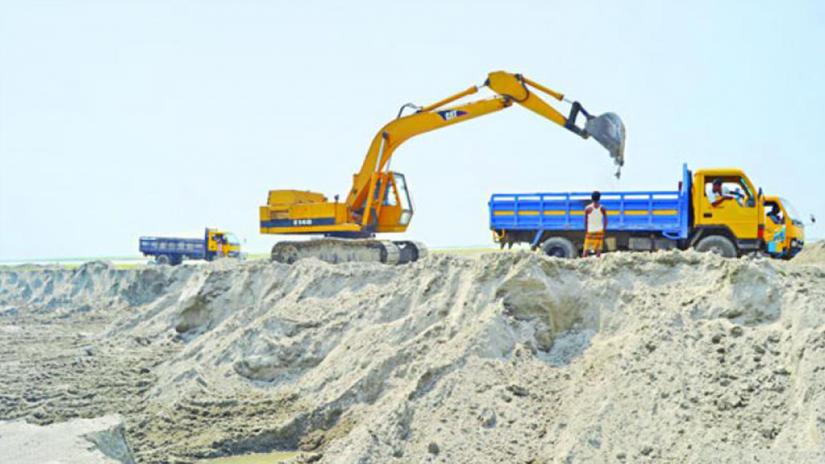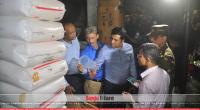 Sand export has the capacity to fetch anywhere between Tk 700 million to 1.2 billion for Bangladesh and several business organisations have already made proposals to export it. However, the government is silent on the matter, say businessmen.
Sand export has the capacity to fetch anywhere between Tk 700 million to 1.2 billion for Bangladesh and several business organisations have already made proposals to export it. However, the government is silent on the matter, say businessmen.
Ministry sources have revealed that it’s the mineral resources ministry that’s against the proposal. They claim that exporting sand will lead to the loss of large amount mineral resources from Bangladesh.
The proposal to export sand, was raised an Executive Committee of the National Economic Council (ECNEC) meeting back in 2016 but the matter didn’t progress from there.
The mineral resources ministry on the other hand hasn’t done much in this sector other than conducting a survey on beach sand. The 1995 survey revealed that the sand contains valuable minerals which might be profitable for the country if purified.
However, beach sand doesn’t have minerals if its own. The minerals mainly come from the river water that mixes into the sea. The study said that riverside sand and soil might be richer in valuable minerals than beach sand.
The commerce ministry said that the government is contemplating exporting sand extracted from the riverbed but it has no immediate plans about beach sand.
“There is a large scope of bringing in foreign currency through export of sand,” said Hedayet Ullah Al Mamun, a former commerce secretary.
He added that there is significant demand for soil in the Asian Sub-continent.
In 2016, private organisation ‘Network and Infrastructure Company’ applied to export 1.5 million tonne of sand to Singapore but received no response from the government.
Several organisations such a Stone Traders, Life International had applied but are yet to receive a response.
“The commerce ministry didn’t respond to our application of exporting sand to Singapore,” MK Mamnur Rashid, Assistant Manager of Network and Infrastructure told Bangla Tribune.
Meanwhile, environment ministry employees are of the view that no matter what the government decides on the matter, they have to ensure that the environment is in no way harmed.
On the other hand the shipping ministry says that unrestrained extraction of sand from the riverbed may lead the rivers to change their course and the risks must be taken into account.
The commerce ministry had formed an eight-member committee after an inter-ministry meeting in 2014. The meeting addressed the issue of increasing the export of products.
The then environment secretary Kamal Uddin Ahmed had said, “Sand can be exported if the environment isn’t damaged.”
“The possibility of drafting a guideline for sand export was discussed in the meeting but the matter didn’t go far due to several complications,” said Commerce Secretary Mofizul Islam.
Bangladesh Atomic Energy Commission sources said that the government had attempted to extract mineral rich sand form the Bay of Bengal. The commission had set up a specialised centre at Cox’s Bazar in 1975 for the purpose as well.
They said that 43 years later, the commission was still engaged in searching and extracting mineral rich substances from coastal areas.
The commission claims that in 40 years of research, they discovered 17 mineral rich masses. The researchers found that Elemnite, Magnetite, Garnet, Zircon, Rutile, Titanium, Lukoxin, Monazite and Kenite are the categories of sand that are both rich in minerals and have economic and commercial possibilities.
According to researchers of the commission, it’s possible to commercially extract 1.76 million metric tonne of mineral rich sand, a part of which can be used in the industries and the rest of it can be extracted.
A mineral resources ministry source told Bangla Tribune that there are mainly two kinds of sand in Bangladesh. One is Zircon, which is used for construction and another is the mineral rich sand.
“Each truck of mineral sand sells for Tk 2,000-3,000. But if it’s treated, then its value will reach more than a hundred thousand,” said mineral resources Deputy Secretary Shahidul Islam.
“It won’t be wise to export it just yet as it will make it difficult for the sand to get GI status later,” he added.
Both Singapore and Maldives has expressed interest to import sand from Bangladesh. In fact the Maldives president, during his visit to Bangladesh in 2010 told Prime Minister Sheikh Hasina about their interest.
Singapore on the other hand imports sand from Indonesia and Malaysia as 20 percent of their land is made from imported sand. The island, a popular tourist destination has been expanding by filling up the sea with sand.
According to reports published by Singapore business portal Trade Winds, the country has high demand of soil and sand in their infrastructural development projects aimed at boosting up industrialisation and trade.
Not only Singapore, the Maldives government has also expressed their interest to Prime Minister Sheikh Hasina to source soil and sand from Bangladesh, say sources familiar with the matter.
However, the Ministry of Commerce is yet to add any clause or guidelines with regard to sand export policies.
 Business
Business
30758 hour(s) 50 minute(s) ago ;
Morning 09:45 ; Saturday ; Apr 20, 2024
Sand export in stalemate
Send
Shafiqul Islam
Published : 09:30, Mar 07, 2019 | Updated : 13:11, Mar 08, 2019
Published : 09:30, Mar 07, 2019 | Updated : 13:11, Mar 08, 2019
0 ...0 ...
/st/
Topics: Top StoriesExclusive
- KOICA donates medical supplies to BSMMU
- 5 more flights to take back British nationals to London
- Covid19: Rajarbagh, Mohammadpur worst affected
- Momen joins UN solidarity song over COVID-19 combat
- Covid-19: OIC to hold special meeting
- WFP begins food distribution in Cox’s Bazar
- WFP begins food distribution in Cox’s Bazar
- 290 return home to Australia
- Third charter flight for US citizens to return home
- Dhaka proposes to postpone D8 Summit
Unauthorized use of news, image, information, etc published by Bangla Tribune is punishable by copyright law. Appropriate legal steps will be taken by the management against any person or body that infringes those laws.
Bangla Tribune is one of the most revered online newspapers in Bangladesh, due to its reputation of neutral coverage and incisive analysis.
F R Tower, 8/C Panthapath, Shukrabad, Dhaka-1207 | Phone: 58151324; 58151326, Fax: 58151329 | Mob: 01730794527, 01730794528






